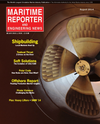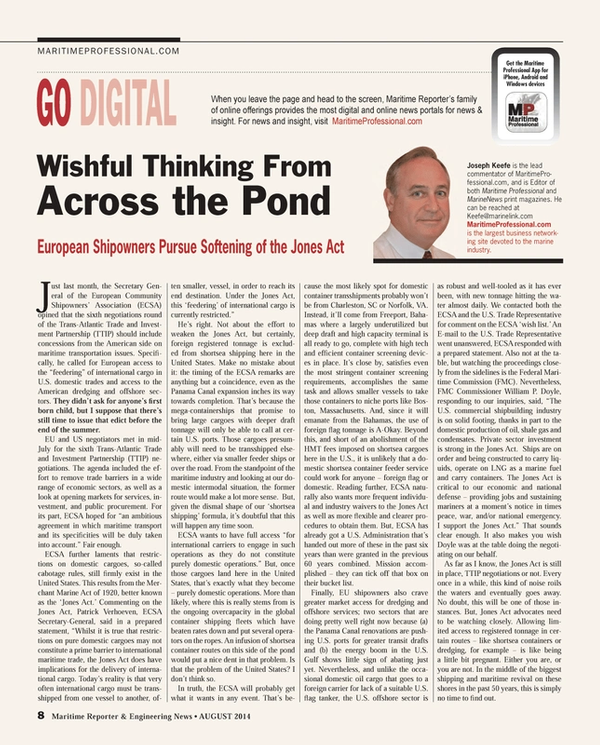
Wishful Thinking From Across the Pond
European Shipowners Pursue Softening of the Jones Act
Just last month, the Secretary General of the European Community Shipowners’ Association (ECSA) opined that the sixth negotiations round of the Trans-Atlantic Trade and Investment Partnership (TTIP) should include concessions from the American side on maritime transportation issues. Specifically, he called for European access to the “feedering” of international cargo in U.S. domestic trades and access to the American dredging and offshore sectors. They didn’t ask for anyone’s first born child, but I suppose that there’s still time to issue that edict before the end of the summer.
EU and US negotiators met in mid-July for the sixth Trans-Atlantic Trade and Investment Partnership (TTIP) negotiations. The agenda included the effort to remove trade barriers in a wide range of economic sectors, as well as a look at opening markets for services, investment, and public procurement. For its part, ECSA hoped for “an ambitious agreement in which maritime transport and its specificities will be duly taken into account.” Fair enough.
ECSA further laments that restrictions on domestic cargoes, so-called cabotage rules, still firmly exist in the United States. This results from the Merchant Marine Act of 1920, better known as the ‘Jones Act.’ Commenting on the Jones Act, Patrick Verhoeven, ECSA Secretary-General, said in a prepared statement, “Whilst it is true that restrictions on pure domestic cargoes may not constitute a prime barrier to international maritime trade, the Jones Act does have implications for the delivery of international cargo. Today’s reality is that very often international cargo must be transshipped from one vessel to another, often smaller, vessel, in order to reach its end destination. Under the Jones Act, this ‘feedering’ of international cargo is currently restricted.”
He’s right. Not about the effort to weaken the Jones Act, but certainly, foreign registered tonnage is excluded from shortsea shipping here in the United States. Make no mistake about it: the timing of the ECSA remarks are anything but a coincidence, even as the Panama Canal expansion inches its way towards completion. That’s because the mega-containerships that promise to bring large cargoes with deeper draft tonnage will only be able to call at certain U.S. ports. Those cargoes presumably will need to be transshipped elsewhere, either via smaller feeder ships or over the road. From the standpoint of the maritime industry and looking at our domestic intermodal situation, the former route would make a lot more sense. But, given the dismal shape of our ‘shortsea shipping’ formula, it’s doubtful that this will happen any time soon.
ECSA wants to have full access “for international carriers to engage in such operations as they do not constitute purely domestic operations.” But, once those cargoes land here in the United States, that’s exactly what they become – purely domestic operations. More than likely, where this is really stems from is the ongoing overcapacity in the global container shipping fleets which have beaten rates down and put several operators on the ropes. An infusion of shortsea container routes on this side of the pond would put a nice dent in that problem. Is that the problem of the United States? I don’t think so.
In truth, the ECSA will probably get what it wants in any event. That’s because the most likely spot for domestic container transshipments probably won’t be from Charleston, SC or Norfolk, VA. Instead, it’ll come from Freeport, Bahamas where a largely underutilized but deep draft and high capacity terminal is all ready to go, complete with high tech and efficient container screening devices in place. It’s close by, satisfies even the most stringent container screening requirements, accomplishes the same task and allows smaller vessels to take those containers to niche ports like Boston, Massachusetts. And, since it will emanate from the Bahamas, the use of foreign flag tonnage is A-Okay. Beyond this, and short of an abolishment of the HMT fees imposed on shortsea cargoes here in the U.S., it is unlikely that a domestic shortsea container feeder service could work for anyone – foreign flag or domestic. Reading further, ECSA naturally also wants more frequent individual and industry waivers to the Jones Act as well as more flexible and clearer procedures to obtain them. But, ECSA has already got a U.S. Administration that’s handed out more of these in the past six years than were granted in the previous 60 years combined. Mission accomplished – they can tick off that box on their bucket list.
Finally, EU shipowners also crave greater market access for dredging and offshore services; two sectors that are doing pretty well right now because (a) the Panama Canal renovations are pushing U.S. ports for greater transit drafts and (b) the energy boom in the U.S. Gulf shows little sign of abating just yet. Nevertheless, and unlike the occasional domestic oil cargo that goes to a foreign carrier for lack of a suitable U.S. flag tanker, the U.S. offshore sector is as robust and well-tooled as it has ever been, with new tonnage hitting the water almost daily. We contacted both the ECSA and the U.S. Trade Representative for comment on the ECSA ‘wish list.’ An E-mail to the U.S. Trade Representative went unanswered, ECSA responded with a prepared statement. Also not at the table, but watching the proceedings closely from the sidelines is the Federal Maritime Commission (FMC). Nevertheless, FMC Commissioner William P. Doyle, responding to our inquiries, said, “The U.S. commercial shipbuilding industry is on solid footing, thanks in part to the domestic production of oil, shale gas and condensates. Private sector investment is strong in the Jones Act. Ships are on order and being constructed to carry liquids, operate on LNG as a marine fuel and carry containers. The Jones Act is critical to our economic and national defense – providing jobs and sustaining mariners at a moment’s notice in times peace, war, and/or national emergency. I support the Jones Act.” That sounds clear enough. It also makes you wish Doyle was at the table doing the negotiating on our behalf.
As far as I know, the Jones Act is still in place, TTIP negotiations or not. Every once in a while, this kind of noise roils the waters and eventually goes away. No doubt, this will be one of those instances. But, Jones Act advocates need to be watching closely. Allowing limited access to registered tonnage in certain routes – like shortsea containers or dredging, for example – is like being a little bit pregnant. Either you are, or you are not. In the middle of the biggest shipping and maritime revival on these shores in the past 50 years, this is simply no time to find out.
Joseph Keefe is the lead commentator of MaritimeProfessional.com, and is Editor of both Maritime Professional and MarineNews print magazines. He can be reached at [email protected]
MaritimeProfessional.com is the largest business networking site devoted to the marine industry.
(As published in the August 2014 edition of Maritime Reporter & Engineering News - http://magazines.marinelink.com/Magazines/MaritimeReporter)
Read Wishful Thinking From Across the Pond in Pdf, Flash or Html5 edition of August 2014 Maritime Reporter
Other stories from August 2014 issue
Content
- Editorial: software ... is it ‘evolution’ or ‘revolution’ ... page: 6
- Wishful Thinking From Across the Pond page: 8
- Panama Canal: The Billion Dollar Challenge page: 12
- OSV Power page: 14
- Polar Code Afoot page: 18
- Logistical Scenario Analysis for Hydrodynamic Applications page: 22
- Challenging the Myths of Pirate Violence page: 24
- Ballast Water Leadership page: 28
- Floating Production Roundup: August 2014 page: 32
- Keeping Machinery in Line with Laser Alignment page: 38
- Remote Diagnostics Help Drive Efficiency Gains page: 42
- News Flash! Greek Shipowners Prefer Bulkers page: 45
- Five Minutes with Gulf Copper’s Dennis Buffo page: 48
- BAE Systems Ship Repair: Leveraging Location, Infrastructure & Workforce page: 50
- Dry Dock Conference 2014 page: 52
- Spotlight on German Shipbuilding page: 58
- ZF Marine Makes a Strong Towboat Thrust page: 62
- Permanent Magnet Technology for Maritime Propulsion page: 62
- Ship Design and Construction Software Solutions page: 67
- Marorka’s Powerplay page: 72
- Indian Shipbuilding on the Road to Recovery page: 76
- Five Minutes with N-KOM CEO Abu Bakar Mohd Nor page: 80
- Realizing the Promise of Brazil Shipbuilding page: 84
- MTR 100: UTEC Survey Inc. page: 85
- ASRY All in on Project Jupiter page: 88
- Navantia Banks on the Future page: 89
- Energy Markets Buoy U.S. Shipbuilding page: 90
- Vigor: Frank(ly) Speaking page: 94
- Need a Lift? page: 96
- Dockside Load Testing with Unique Seaflex page: 97
- The Lowdown on Lifting page: 102
- SmartGrip: An ‘Evolution’ in Bulk Handling page: 104
- Shippers Must Reduce Costs, Boost Efficiency page: 106
- Fight Piracy – Intelligently page: 110
- Using HydroComp NavCad page: 112
- Keep it Clean & Green page: 114
- Victaulic Vic-Press System Receives Five New Type Approvals page: 119
- Bolidt Decking, Flooring page: 119
- Steering Alert System page: 119
- Bug-O Zipper Welder page: 119
- Envitia Launches MapLink Pro 8.0 page: 119
- Vosta LMG Delivers New Dredge Ball Joints page: 119
- Furuno Adds Color Display to NavPilot 700 Series page: 119


